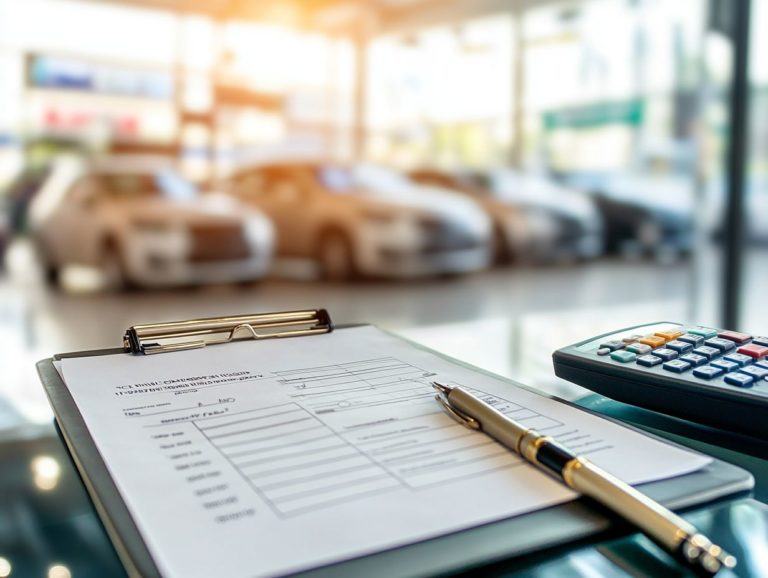Understanding the Final Cost of Leasing a Car
Leasing a car is a smart way to manage money, giving you flexibility and access to the latest models without the hefty price tag.
However, navigating the details of car leasing can be challenging. Let s dive into what you need to know about leasing a car today, from understanding key terms and costs to uncovering hidden fees that might surprise you.
You’ll also find useful tips for negotiating better lease deals and an explanation of lease buyout options. By the end, you’ll be well-equipped to make informed decisions and truly maximize the benefits of your leasing experience.
Contents
- Key Takeaways:
- What is Car Leasing?
- The Costs of Leasing a Car
- Hidden Fees and Charges
- How to Negotiate a Better Lease Deal
- Lease Buyout Options
- Frequently Asked Questions
- What is the final cost of leasing a car?
- How is the monthly lease payment calculated?
- Are there any fees associated with leasing a car?
- What is the difference between a down payment and a security deposit?
- Are there any penalties for ending a lease early?
- Is it possible to negotiate the final cost of leasing a car?
Key Takeaways:
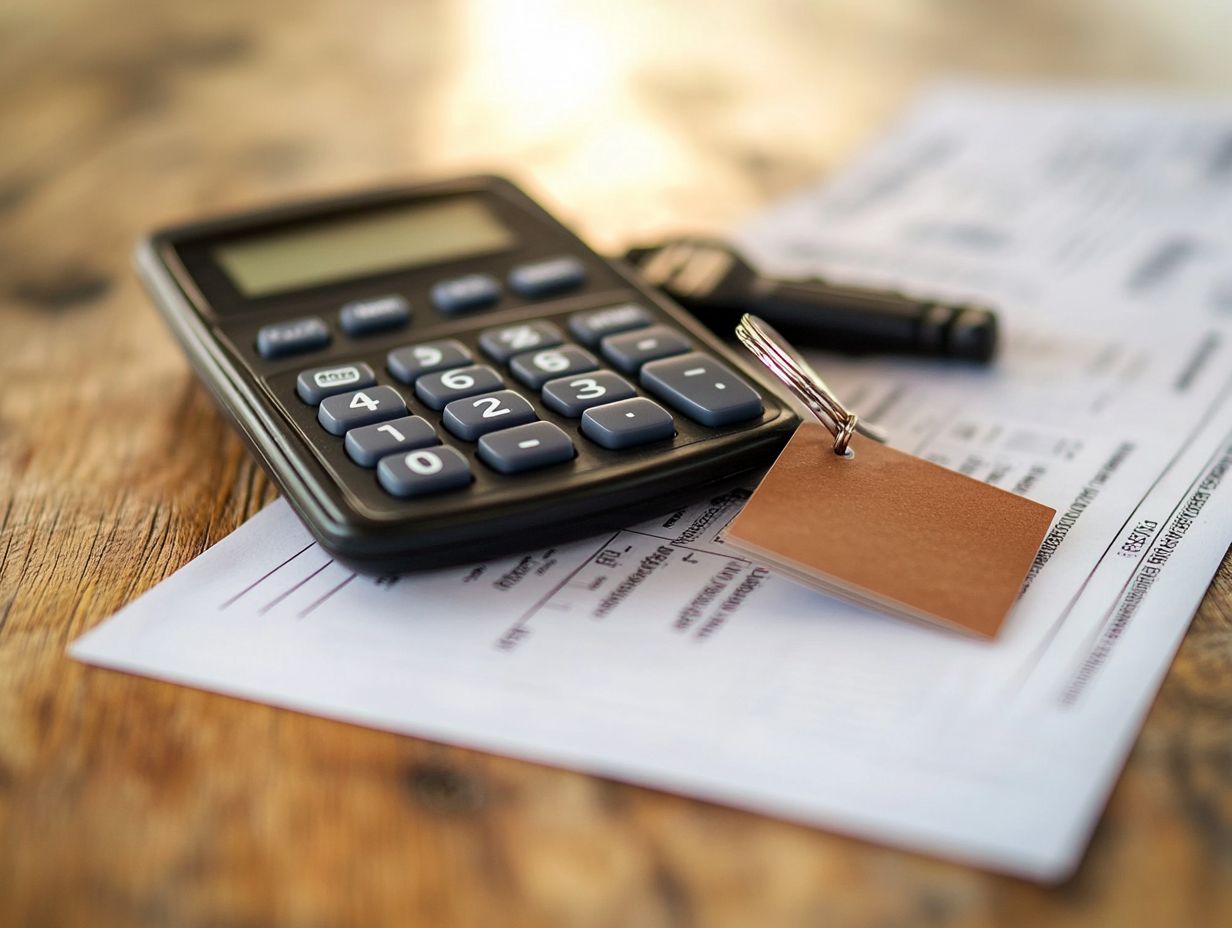
- Car leasing involves paying initial fees and monthly payments to use a vehicle for a set period.
- The total cost of leasing a car depends on factors such as credit score, mileage limit, and lease term length.
- When negotiating a lease deal, be aware of hidden fees and charges, and consider buyout options for potential savings.
What is Car Leasing?
Car leasing is a great way to drive a new vehicle without the burden of an outright purchase. Typically lasting 24 to 36 months, this method offers several advantages, such as lower average monthly payments compared to traditional financing, making it an attractive choice for many drivers.
Leasing agreements often include vehicle maintenance and warranty coverage, making leasing new cars even more appealing especially when financial considerations may arise.
Definition and Key Terms
To navigate the leasing landscape effectively, it s crucial to understand key terms like acquisition fee and total price of the car. These terms significantly impact your overall leasing expenses.
The acquisition fee is a one-time charge that covers the administrative costs of starting your lease. The total price of the car is the negotiated price, which serves as the basis for your monthly payments.
Lease agreements detail not only these costs but also mileage limits and maintenance obligations. Understanding how each component interacts is vital for making informed choices and managing your financial responsibilities confidently.
The Costs of Leasing a Car
Understanding the costs associated with leasing a car is crucial for your financial planning, whether for personal or business use. This includes not only the upfront expenses like down payments but also monthly payments and other lease-related fees, which can vary widely.
Grasping these elements will help you make informed decisions that align with your financial goals.
Initial Fees and Monthly Payments
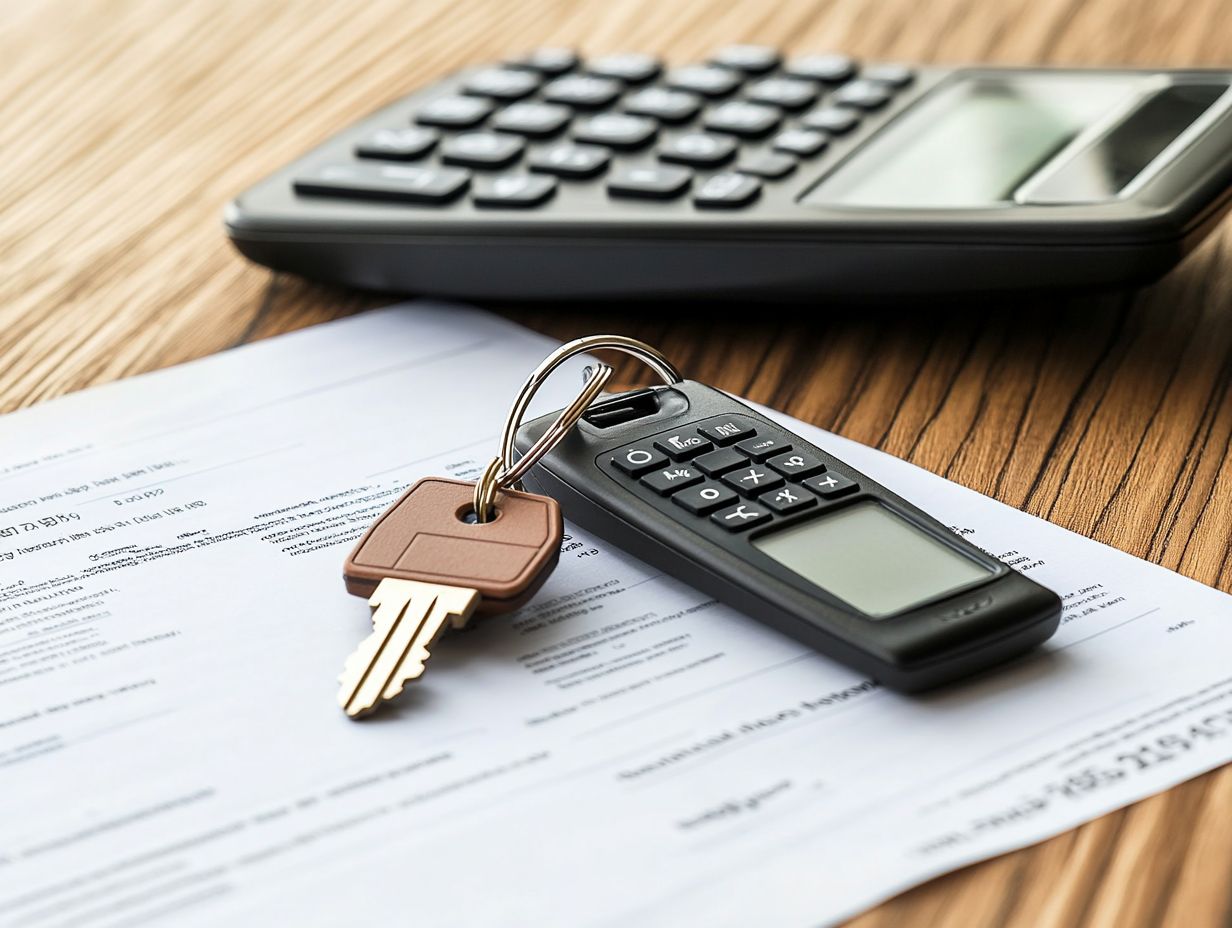
When entering a leasing agreement, consider initial fees like the down payment and acquisition fee, followed by monthly payments that cover your vehicle’s use.
The down payment can vary significantly, ranging from a few hundred to several thousand dollars, depending on your lease terms and the type of vehicle. The acquisition fee, often included in the total cost, serves as a processing charge and can add several hundred dollars to those initial expenses.
Monthly payments are calculated based on several key factors, including the car’s depreciation and its residual value the estimated worth of the vehicle at the end of the lease. Understanding these components is essential if you’re considering leasing, as they greatly impact both your initial costs and ongoing financial commitments.
Factors Affecting the Final Cost
Several factors can significantly influence the final cost of leasing a car. Knowing them helps you make smart choices. The money factor, which is similar to an interest rate, the residual value, and mileage limit all play critical roles in shaping your overall leasing costs and financial commitments.
Grasping these components is essential if you’re contemplating a lease, as each directly impacts your monthly payments. The residual value represents the estimated worth of the vehicle at the end of the lease term, affecting both your monthly rates and any potential equity you might have.
It s also vital to keep a vigilant eye on mileage limits. Exceeding them can result in significant fees. By fully understanding these elements, you position yourself to negotiate terms that align seamlessly with your financial objectives.
Hidden Fees and Charges
Leasing might appear simple at first glance, but hidden fees and charges can easily catch you off guard. Be aware of return fees, extra mileage charges, and wear-and-tear costs that can silently add up over the duration of your lease.
Commonly Overlooked Expenses
In the leasing process, it’s easy to overlook expenses that can inflate the overall cost of leasing a vehicle. These include wear-and-tear fees and return fees at the end of your lease term. Such unforeseen expenses often slip through the cracks during initial calculations but can profoundly impact your total cost of ownership.
To navigate these potential pitfalls effectively, you should meticulously review the lease agreement, ensuring you grasp the terms related to mileage limits and condition assessments. Setting aside a budget for routine maintenance is also a prudent move; neglecting minor repairs could lead to hefty penalties when it s time to return the vehicle.
Engage in a candid discussion with your leasing agent for a clearer understanding of all charges that might arise during the lease duration.
How to Negotiate a Better Lease Deal
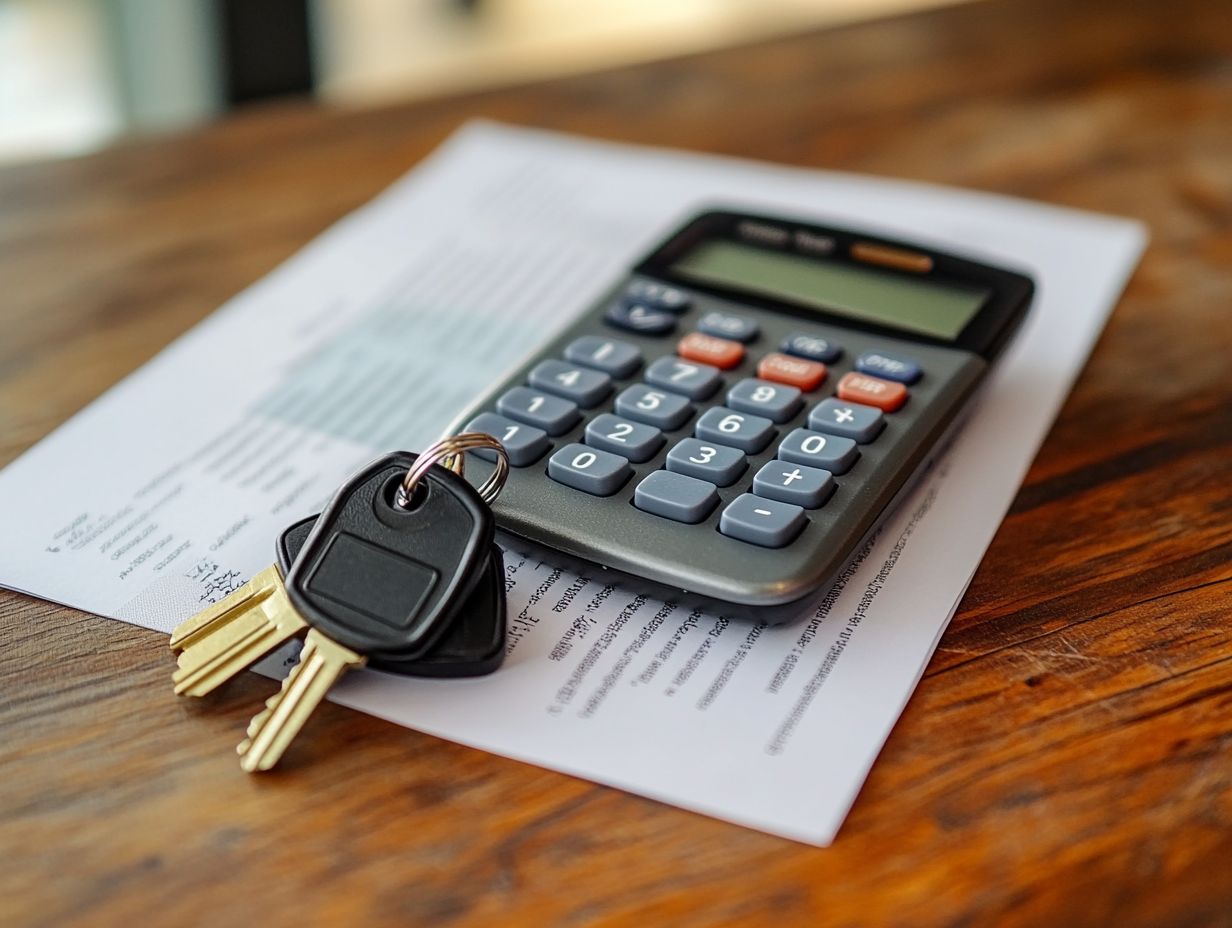
Negotiating a better lease deal requires a deep understanding of the leasing process. By familiarizing yourself with various leasing terms and costs, you can secure a more favorable lease agreement.
This knowledge enables you to navigate the complexities of leasing with confidence and achieve the best possible outcome.
Tips for Lowering Costs
To effectively lower costs when leasing a car, employ strategies such as negotiating lease terms, considering a trade-in vehicle, and understanding the leasing benefits offered by dealerships. These methods enable you to navigate the leasing process with confidence and clarity.
Mastering negotiation techniques is crucial. For instance, researching current market rates arms you with the information needed to counter dealership offers effectively. Evaluating the value of your trade-in vehicle not only provides a substantial down payment but could also lead to lower monthly payments.
Be aware of special promotions or incentives at different dealerships. This can further ease your financial burden, ensuring you secure the best deal possible while optimizing your budget.
Lease Buyout Options
Don t miss out on lease buyout options! You can own your vehicle at the end of your lease term. This can be a financially advantageous choice, depending on the buyout prices and the timing of your purchase. Explore your leasing options further or contact a dealership for more information!
Understanding Buyout Prices and Timing
Understanding buyout prices and the timing involved is essential for you as a lessee considering a lease buyout. Factors like residual value the estimated worth of your vehicle at the end of the lease and depreciation how much value your vehicle loses over time play significant roles in determining your final cost.
You must also consider market conditions and interest rates, as they can significantly affect the overall valuation. The length of your lease and the initial terms you agreed upon further influence the buyout price. It s crucial to review your contract meticulously.
Another critical aspect to keep in mind is your vehicle’s mileage and condition at the time of buyout; excessive wear or over-mileage could inflate your costs. Timing is vital executing the buyout at the end of the lease term, when depreciation is lower, can offer you considerable savings compared to an earlier buyout.
Understanding these details can lead to incredible savings! Not only does this knowledge enable you to make an informed decision, but it can also lead to significant financial advantages.
Frequently Asked Questions
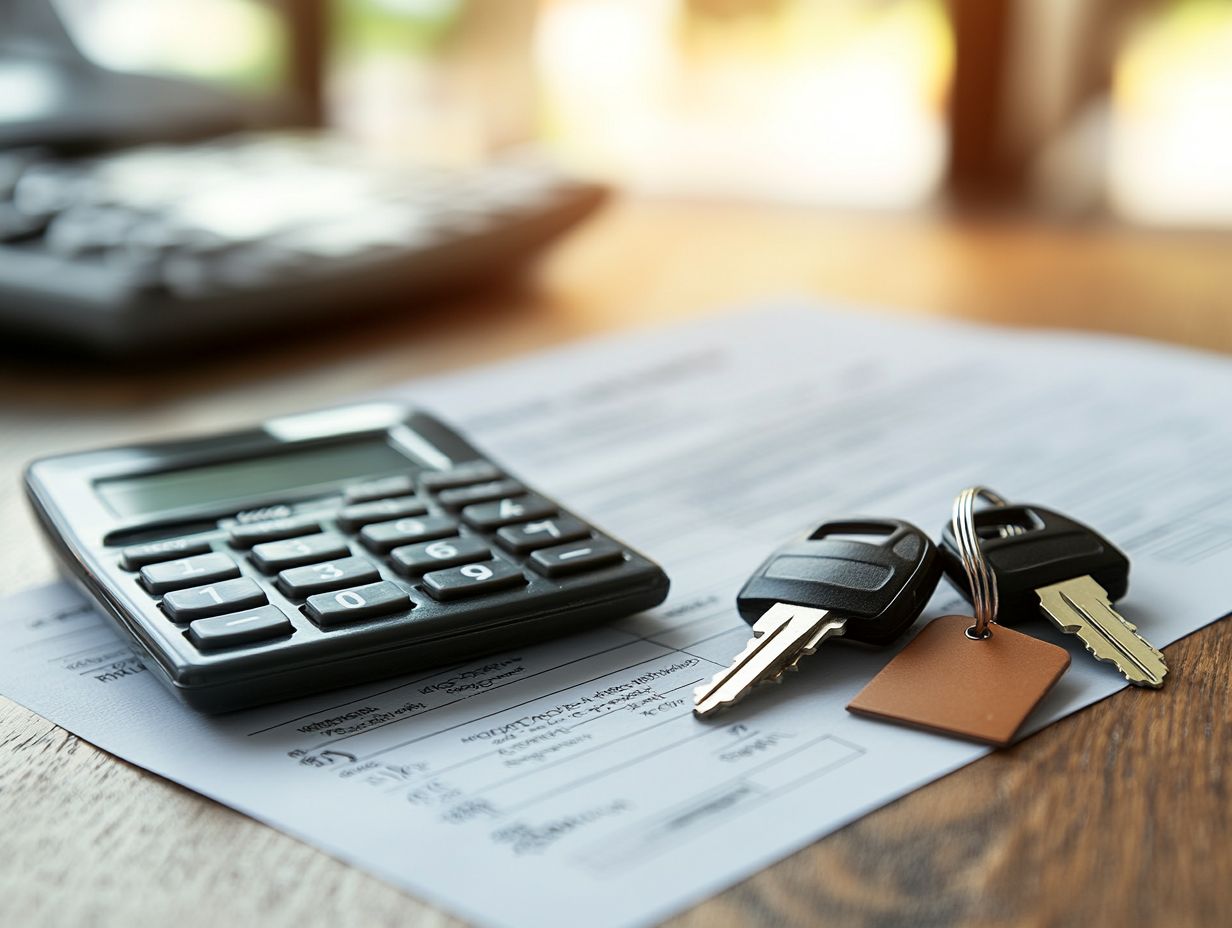
What is the final cost of leasing a car?
The final cost of leasing a car includes the monthly lease payment, taxes, fees, and any additional charges or penalties incurred throughout the lease term, making it important to understand the total cost of car ownership.
How is the monthly lease payment calculated?
The monthly lease payment takes into account the vehicle’s price, down payment, lease term, interest rate, and residual value. These factors determine the amount you will pay each month.
Are there any fees associated with leasing a car?
Yes, there are usually fees such as acquisition fees, disposition fees, and documentation fees. These can vary depending on the leasing company and should be included in the final cost of leasing a car.
What is the difference between a down payment and a security deposit?
A down payment is a lump sum payment made at the beginning of the lease to lower the monthly payment. A security deposit is a refundable amount paid at the start of the lease to cover any potential damages or excess mileage at the end of the lease term.
Are there any penalties for ending a lease early?
Yes, there may be penalties for ending a lease early, such as early termination fees or remaining lease payments. It is important to carefully consider the lease term before signing the agreement.
Is it possible to negotiate the final cost of leasing a car?
Yes, you can negotiate the final cost of leasing a car. Negotiate the price of the vehicle, interest rate, and any additional fees to potentially lower the overall cost of the lease.




